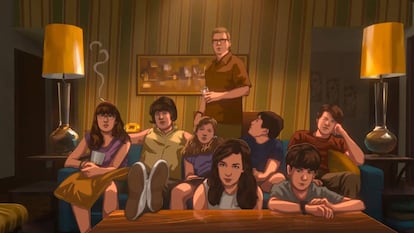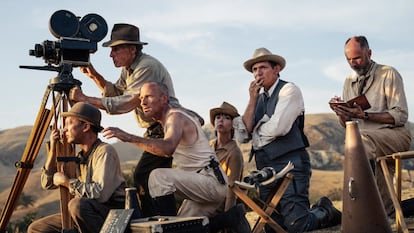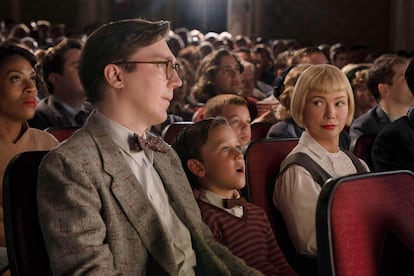Nostalgia and popcorn: Cinema takes a look in the rearview mirror
Hollywood’s latest search for meaning returns to an age of innocence with movies like ‘Babylon,’ ‘Nope’ and ‘The Fabelmans’

Two classic movies about the decline of old Hollywood and the traumatic transition from silent films to “talkies” came out in the 1950s: Billy Wilder’s Sunset Boulevard (1950) and Stanley Donen and Gene Kelly’s Singin’ in the Rain (1952). While Wilder used Gloria Swanson’s decadent and feline beauty as a tragic incarnation of the lost Olympus, Kelly and Donen evoked the vanishing of a glorious constellation of movie stars with a cleansing rainstorm. Hollywood honored its past without fear of the future.
Seventy years later, a new spate of movies looks at Hollywood’s past at a cinematic turning point marked by relentless technological advances. A new earthquake, like the arrival of sound films, is shaking the world of cinema after a pandemic that drove huge numbers of movie lovers from the theaters. If television precipitated the New Hollywood, the digital revolution has dynamited the very nature of cinema with ubiquitous special effects and the credo of the algorithm.

This trend led Caitlin Quinlan to write a long article in Art Review, calling it a tiresome “love letter to cinema.” There’s room for everyone in this love letter. A scene from Sam Mendes’ latest film, Empire of Light, shows actress Olivia Colman crying alone in front of a movie screen, while Damien Chazelle’s over-the-top Babylon closes with a long montage of iconic movie scenes. Chazelle’s hodgepodge frequently flashes to Singin’ in the Rain, even though the contagious optimism of Kelly and Donen’s musical is light years away from the La La Land director’s hollow baroqueism. “The concept of a ‘love letter to the movies’ has become so pervasive in film marketing and criticism that it’s become a joke,” writes Quinlan.
Babylon’s closing montage includes a fleeting image that also appears in Nope. This remarkable Jordan Peele film offers a thoughtful commentary on the visual exhaustion and nightmarish monsters produced by digital special effects. Nope is a daring cocktail of cinematic references open to all sorts of interpretations. Like Babylon, it includes images of the running horses created by Eadweard Muybridge, an English photographer known for his early work in motion-picture projection. In the movie’s deconstruction of the blockbuster phenomenon, Jordan Peele points directly to its father – Steven Spielberg – and Jaws, the 1975 film that started it all.
Speilberg’s The Fabelmans is another of the autobiographical fiction stories dominating movie screens of late. However, his wonderful film is more melancholic than nostalgic, as if the renowned filmmaker didn’t really want to revisit his troubled adolescence, but that’s when he discovered his love of movies. Sammy, the character who represents young Spielberg, goes with his parents to see Cecil B. DeMille’s The Greatest Show on Earth (1952). In a memorable scene, Sammy’s open hands turn into a small movie screen – the future filmmaker has the world in his hands.
In his 2017 book on film theory (Bajo el signo de la melancolía), Santos Zunzunegui writes that cinema and melancholy are inseparable because of the medium’s unique ability to summon images of long-gone worlds. James Gray’s Armageddon Time, Paul Thomas Anderson’s Licorice Pizza, and the more recent Apollo 10 ½ by Richard Linklater are all unapologetically nostalgic. They long for the bygone world of pinball machines, old television shows and harmless hijinks that imply the end of innocence for America’s cultural hegemony.

Films that look back at falling in love with the movies abound in Hollywood and beyond. British filmmaker Joanna Hogg’s The Souvenir and The Souvenir Part II sequel (2019-2021) is a semi-autobiographical account of her years as a film student in London. Ten years ago, Tsai Ming-liang’s Goodbye, Dragon Inn had a recent cameo in Pan Nalin’s Last Film Show (2021), which pays homage to the cinema of the past.
American films in this vein include Quentin Tarantino’s Once Upon a Time in... Hollywood (2019). While Tarantino’s look at the heart of a community of winners and losers was expertly crafted and well-received, Andrew Dominik’s Blonde (2022) was less successful at debunking the myth of Marilyn Monroe and Hollywood at its most phantasmagorical.
Some say nostalgia is a defense mechanism used in times of crisis. Spielberg admitted that he would not have made The Fabelmans if not for the heavy awareness of mortality he felt during the pandemic. “That sense of great fragility gave me the courage I needed,” said Spielberg.
Unfortunately, that feeling lends itself to risky manipulation or drifts into a delirium that produces a series like Stranger Things and countless remakes, reboots and spin-offs. The rearview mirror strategy scaled new heights this year with the film Spielberg said could save the movie theater. Yes, it’s Top Gun: Maverick, Tom Cruise’s return to skies above and a new edition of popcorn nostalgia.
Sign up for our weekly newsletter to get more English-language news coverage from EL PAÍS USA Edition
Tu suscripción se está usando en otro dispositivo
¿Quieres añadir otro usuario a tu suscripción?
Si continúas leyendo en este dispositivo, no se podrá leer en el otro.
FlechaTu suscripción se está usando en otro dispositivo y solo puedes acceder a EL PAÍS desde un dispositivo a la vez.
Si quieres compartir tu cuenta, cambia tu suscripción a la modalidad Premium, así podrás añadir otro usuario. Cada uno accederá con su propia cuenta de email, lo que os permitirá personalizar vuestra experiencia en EL PAÍS.
¿Tienes una suscripción de empresa? Accede aquí para contratar más cuentas.
En el caso de no saber quién está usando tu cuenta, te recomendamos cambiar tu contraseña aquí.
Si decides continuar compartiendo tu cuenta, este mensaje se mostrará en tu dispositivo y en el de la otra persona que está usando tu cuenta de forma indefinida, afectando a tu experiencia de lectura. Puedes consultar aquí los términos y condiciones de la suscripción digital.









































